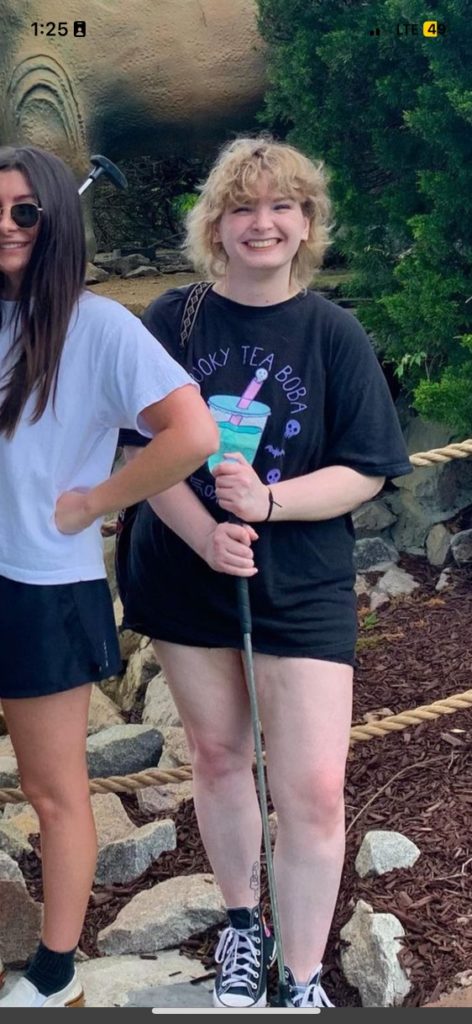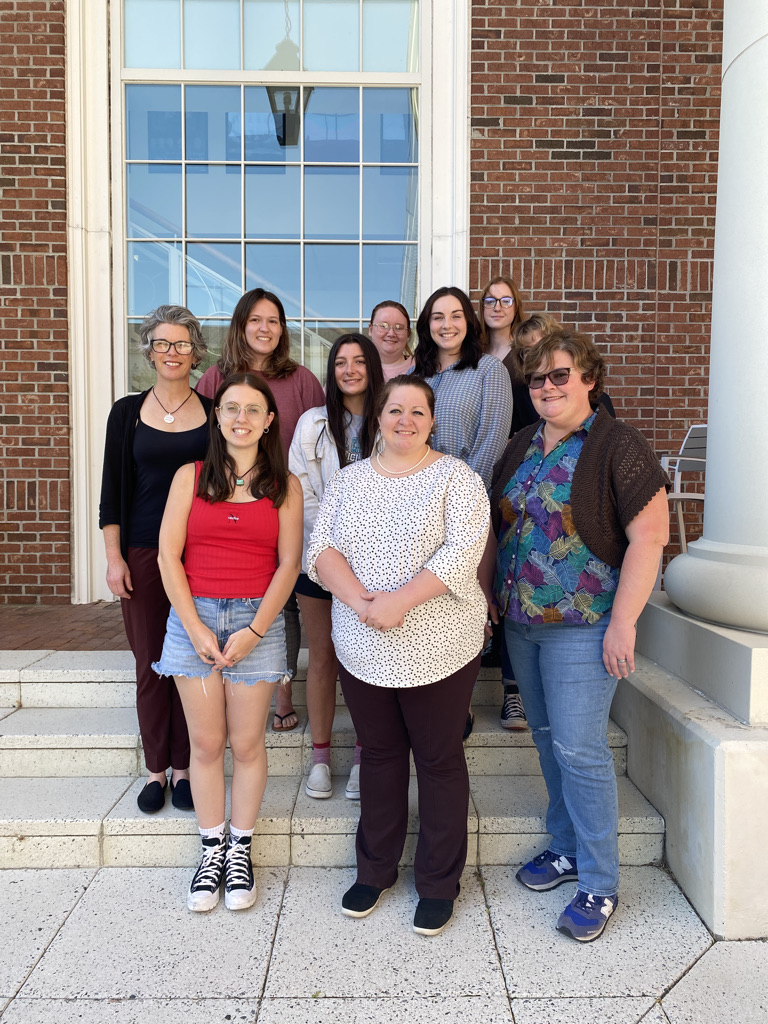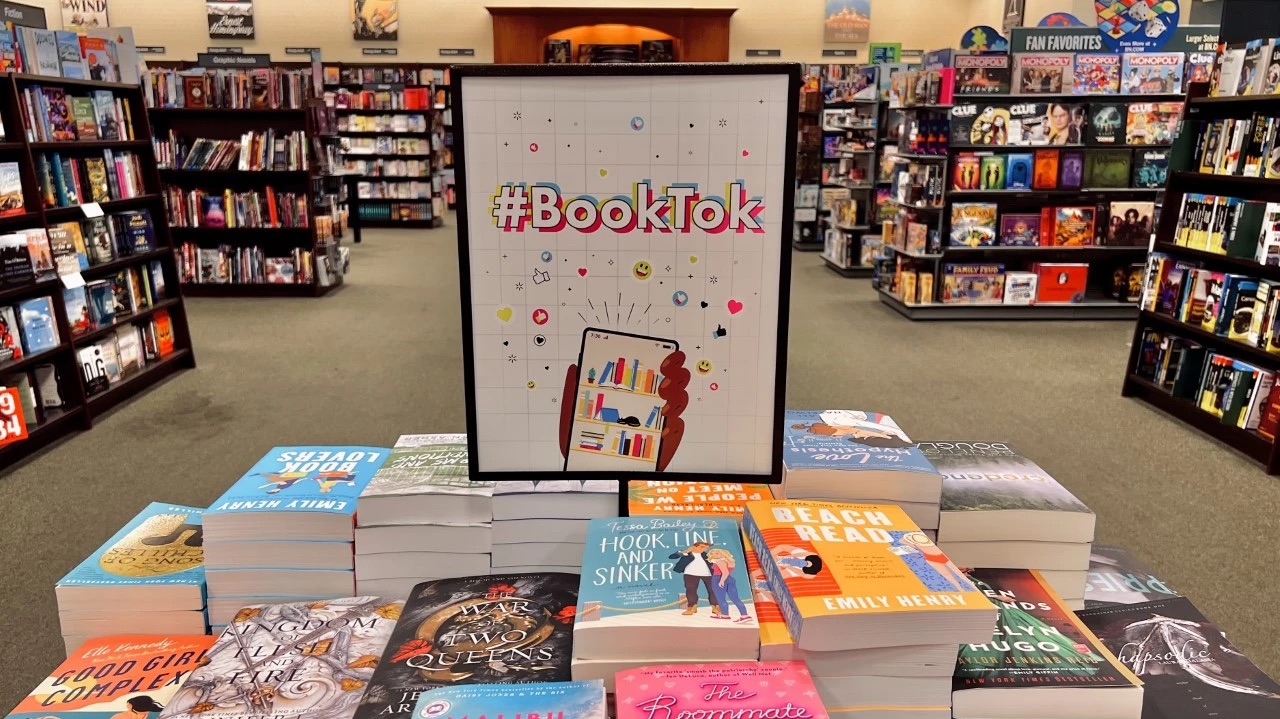Pictured above, top row, left to right: Carissa Soukup, Kristina Gray, Kathryn Feazel-Kwiatkowski; front row left to right:, Dr. Kate Oestreich, Melanie Schlesser, Cameron Parker, Triniti Fisher, Lilith Yurkin (concealed), Jennifer Terry, and Catie Zimmer.
If you’ve ever seen a TED Talk on YouTube, you’ve probably thought, “Hey, that’s really cool. All of these people came to support this speaker who seems to know a lot about this subject.” You might not know that academic conferences work a lot like TED talks, and students in the Master of Arts in Writing (MAW) program have recently had a chance to take to the professional stage with their work.
Dr. Kate Oestreich, associate professor of English and coordinator of the MAW program, incorporated a focus on professionalization in her Principles of Editing and Publishing course this semester. After speaking with many current MAW students about the program, she realized that “in academia, we have artificial constraints set up where every student is working independently, and the only person they talk to or share their work with is the professor.” To address this issue, Oestreich incorporated collaboration into her classroom to build her students’ confidence and prepare them for the real-world situations they will face in their careers.
With this in mind, Oestreich encouraged all her graduate students to apply for an academic conference to share their work with others in a professional setting and have the opportunity to network with others in the English community. While many of the students submitted to different conferences, five were accepted to speak at the 2023 Comparative Literature Conference on Digital Pasts and Futures; and one student, Morgan Phelps, even received funding to attend the conference in person at Long Beach, California.

By attending and presenting at academic conferences this semester, Coastal’s MAW students gained professional experience in ways the program has never seen before. MAW student Triniti Fisher explained how taking this graduate course exposed her to a new professional world. “Before this [class], I didn’t even know, honestly, how academic conferences worked or any of that,” said Fisher. “So, going through this process, seeing how it all works, has been really helpful.”
While all the students participating in the conferences chose their own topics, they all used the platform Collaborative Organization of Virtual Education (COVE) to access and annotate readings in an accessible way. One student, Kristina Gray, incorporated COVE in her paper by explaining how she plans to use it in her classroom as a high school English teacher, saying, “You can have the kids work together on looking at a map and a timeline and things like that. And, through it, there’s a lot of access to so many things.” Gray boasts about the inclusivity of COVE and the benefits of its use in the classroom.
Reflecting on the success rate of her students in this class, Dr. Oestreich expresses how proud she is. “I kept coaching them, being like, ‘You’re going to get turned down. It’s going to be okay. This is a safe space,’ said Dr. Orestreich. “And yet, here we are!”
Many students echoed this sentiment, stating their gratitude for such an opportunity.
MAW student Catie Zimmer expressed shock at getting accepted to the conference for which she applied, saying, “[It] was so crazy for me to, one, get an email saying, ‘Come speak at this conference across the ocean’ and, two, seeing them say, ‘We like what you have, and we want to hear it,’ which is something I never thought I would get from my academic writing.”
Oestreich added that building experience by presenting at conferences can go a long way in a job search. “It’s great to be adding something to your resume every year that will set you aside from the rest of the pack when you graduate,” said Dr. Oestreich. “You have got to get those publications and presentations on there.”
New and existing MAW students interested the editing and publishing field are encouraged to take this hands-on, collaborative course.
Senior English major Evelyn Scott co-authored this piece with Jordan Philo


